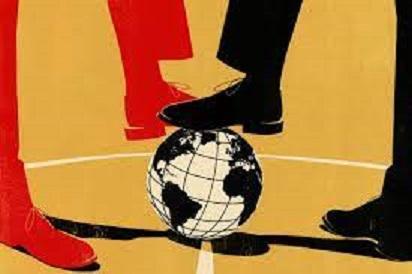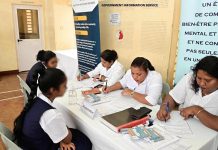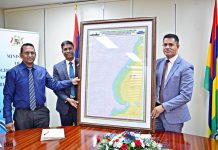Africa-Press – Mauritius. This paper is not intended to be comprehensive in scope. It is simply an attempt at providing some insights on our relations with the outside world in a period characterised by political fluidity and volatility and rampant economic globalisation.
While views on foreign policy may differ, a few indisputable fundamentals underpin this issue. Indeed, no foreign policy can operate or be formulated in a vacuum or isolated manner. Foreign policy is the pursuit of national interest and therefore an integral part of overall national policy.
In the case of Mauritius, a whole set of historical and economic determinants and their interplay with the changing external environment, increasingly now in a regional context, have shaped our foreign policy. Foreign policy cannot be static. Ours has been marked by a high degree of pragmatism dictated by the circumstances of a dynamic world.
But a strong undercurrent of continuity founded on fundamental values and objectives including, among others, the upholding of our sovereignty and territorial integrity, respect for international law, the establishment, preservation and consolidation of bilateral and multilateral relations, both political and economic, has guided our foreign pursuit since independence, albeit, with certain nuances in approach.
This continuity constitutes the bedrock of our foreign policy and provides a sense of direction as we strategize for the future. Diplomacy is the instrument by which one conducts foreign policy.
Mauritius has chosen to conduct its foreign policy and, rightly so, using varying strategies that regulate diplomatic practice. Depending on circumstances, we have utilised at certain times high-visibility diplomacy and at others discreet diplomacy.
High-visibility diplomacy relates mainly to such activities as state and official visits, hosting of or participating in major regional and international events, among others.
Well managed, such activities serve to project the country’s brand image and enhance its international presence. Behind the perceived glamour, these activities constitute powerful instruments for advancing our bilateral and international interests. At the other end of the spectrum, diplomacy is equally an art of discretion.
It involves in certain cases long-term engagement especially as regards politically sensitive issues, such as those dealing with sovereignty, as indeed certain aspects of trade negotiations, which require quiet diplomacy and where progress on the desirable outcome is often hardly perceptible to the general public.
While gauging the results of our diplomatic endeavours, it is obvious that these would not have been attained had we pursued foreign policy from the confines of our offices.
It is equally true that our size and remoteness compounded with our lack of natural resources, condemn us to be in the mainstream of international interaction. We cannot exist in isolation or indulge in any form of autarky.
Political and economic imperatives dictate that we open up to the outside world, apprehending issues from a regional and international perspective beyond the narrowness of national framework.
Such an approach allows us to strategically integrate our own agenda into that of the region and the wider international community, thereby mobilising greater awareness of our specific concerns and needs as a small island developing state while effectively participating in the process of regional economic integration.
The perception that diplomacy has only to do with ceremonials is a fallacy and needs to be immediately challenged. The objective analyst would be amazed by the stupendous amount of intense diplomatic activities taking place everyday in a small country like Mauritius or in which it is directly involved abroad.
Daily advocacy and political input by the diplomatic service on a whole array of pressing national issues and responses to representations made by foreign governments and various other stakeholders combine to create a never-ending sense of urgency and pressure, reflecting the speed at which the world is evolving and the increasing importance of diplomacy in such a context.
Such activities regrettably but understandably go unnoticed by the public, which is more attuned to sensationalism. A major challenge in diplomacy is to be able to establish linkages between issues and address these accordingly.
Foreign policy therefore needs to be apprehended holistically with due regard at all times to national interests. No particular foreign policy issue can be treated in isolation. Therefore, contrary to what many believe and claim loudly, diplomacy is not a trade that can or should be practised on a public platform.
Irreparable damage can be caused by reckless and ill-thought out comments on a particular foreign policy issue, sometimes made by persons who consider themselves qualified to make such comments.
Insightful as they may sound to the public, such comments, devoid of a vue d?ensemble, are often sadly lacking and may even be misleading. Situations arise where people having diplomatic duties thrust upon them temporarily, make public comments which, for the same reasons, may be also misleading.
The pursuit of our national interests abroad dictates a diplomacy practised at times with passion, while remaining dispassionate at other times. Courage of conviction, seriousness of purpose and an unshakeable conviction that, despite our small size, we have a rightful place and role to assume in the pursuit of our interests go a long way to propel us to assume responsibilities of international dimensions.
Passion, conviction, self-motivation, dedication and meaningful networking form part of those credentials, which make up personal diplomacy. At a time when we are fully engaged in regional, global and economic diplomacy, personal diplomacy is often a key to unlock situations of impasse or achieve what traditional approaches cannot.
A quick glance at the road run so far Having set the framework within which foreign policy is conducted, we shall highlight some salient features of our achievements so far, to chart the way ahead.
Like many newly independent countries, Mauritius initially had to rely much on history and traditional economic ties as major determinants of its foreign policy.
Our close bilateral relations with UK, France, India and China reflect this historical and economic legacy. Just as other countries, Mauritius was not exempt from the pressures of the cold war.
However, pragmatism, combined with timely diplomatic craftsmanship, allowed Mauritius, as the first English-speaking country, to be party to the Yaoundé Conventions, which later became the ACP-EU Lomé Conventions.
When the UK joined the EC, it was vision and the need to provide security to an industry, which was the main source of employment, that made us commit the bulk of our sugar production to the EU market under the preferential terms of the Sugar Protocol.
The expansion of our bilateral and international relations has been a driving force of our foreign policy. Bilaterally, we sought and concluded cooperation agreements with many countries in various sectors.
Close engagement with regional and sub-regional processes (OAU, COMESA, IOC, SADC) and our wider international associations (UN and its various agencies, the Commonwealth, the Non-Aligned Movement, Francophonie, etc.) have allowed us to determinedly overcome the constraints of remoteness and size.
Through the UN and other multilateral fora, Mauritius has played a prominent role in mobilizing world attention to the particular situation of Small Island Developing States (SIDS), including their inherent vulnerabilities and the need for special consideration in the international system.
The International Meeting on SIDS, scheduled for January 2005, bears testimony to our commitment to seek a global response in addressing the particular situation of SIDS.
The membership of Mauritius in the UN Security Council as a non-permanent member (2001-2002) for a second time is an illustration of our active involvement with UN processes and our ability to live up to our international responsibilities.
As a good international player, Mauritius has adhered to regional and international treaties and conventions related to various political, social and cultural issues and dutifully honours its obligations thereunder.
On the economic diplomacy front, Mauritius continues to play a prominent role be it in the context of the Cotonou Agreement or at the WTO in the pursuit of our interests.
Volumes have been said and written about the Sugar Protocol and our constant and consistent articulations in defence of the mechanism that regulates this north/south commercial instrument.
Over the years we have developed a sound capacity in this sector, which has now permeated other sectors of our economic diplomacy particularly at WTO level.
Negotiations of regional trading arrangements within the SADC and COMESA and currently of the ACP-EU Economic Partnership Agreements as well as our active involvement with the enactment of AGOA I to III have given new dimensions to our overall foreign policy with a greater participation of other stakeholders, including the private sector.
A recent example of the success of our economic diplomacy is the derogation obtained under the Third Country Fabric Regime of the US despite all odds and certain prophets of doom.
Since the early nineties, our active participation in the multilateral trade negotiations at various levels with the timely establishment of our Mission in Geneva has changed the overall thrust of our diplomacy.
Our strong militancy for the maintenance of preferential arrangements, particularly in agriculture, and a special treatment for Small Economies has brought new dimensions to our bilateral relationships, which thus were no longer solely contingent on political or cultural considerations.
The need to develop common negotiating positions in relevant multilateral fora drove us to establish new bilateral links or consolidate existing ones. Mauritius is now strategically part of new groupings and alliances (such as the G90) at WTO level, which transcend traditional politics.
However, the underlying principle of our foreign policy objectives has remained the same: the pursuit of national interests, albeit in the larger context of regionalism and globalisation. Projecting what the country can offer to the world has been a key foreign policy objective.
Through hosting, over the past years, of many high-level regional and international events, including many Summit and Ministerial Conferences and sports events and the very professional servicing of these events, Mauritius is increasingly recognized as an important conference centre in this part of the world.
Similarly, our record of delivering on our leadership responsibilities (OAU in 1976, Francophonie in 1993, the ACP Group several times, UN Security Council for a rotating one month in 2002 and currently SADC) as well as the election/appointment of our nationals to high-level positions at such institutions as the OAU/AU, SADC, and IOR-ARC and, within the UN system, including their own track record of excellence while in office, have enhanced the visibility of the country.
The challenge is to build on this reputation. Defending and preserving our sovereignty and territorial integrity has been an underlying characteristic of our foreign policy.
Our relentless diplomatic initiatives relating to our sovereignty claims on the Chagos Archipelago and Tromelin are a testimony of the importance we attach to this issue.
These “friendly disputes” are of considerable concern to us and our endeavours have highlighted the legitimacy of our cause as reflected by the support we have mustered from the International Community. The struggle continues.
Viewed from a general perspective, we have had to place at different times, different degrees of emphasis on the nature of our external relations, favouring at times the bilateral, and at others the regional and/or international and, more recently, on the multilateral.
The difference in emphasis is shaped by the dictates of the time. The high visibility of our diplomatic achievements in any given period depends to a large extent on proper ventilation of the achievements and effective communication and leadership both at political and professional levels.
On the other hand, we have to be wary that we do not slide into self-complacency and other tendencies raised earlier. There is need, therefore, to constantly revisit our strategies and remain dynamic and visionary in response and anticipation to the exigencies of the time.
The way forward Respect for our sovereign rights, openness to the world, achievement of sustainable development, continued engagement with the region and the international system, strengthening of our bilateral ties, with a focus on partnership rather than traditional forms of cooperation, greater emphasis on economic diplomacy, projecting Mauritius internationally as a meeting place, as a promising business centre and a provider of first-class services will continue to be guiding principles for an effective foreign policy in the years to come.
However, much will also depend on both the internal and external factors which have foreign policy implications for Mauritius. ■ Internal Economic Factors Our economy is very dependent on foreign trade and tourism.
There is however, the growing realization that the traditional sectors of sugar, textile and tourism are no longer capable of sustaining further wealth and job creation.
Indeed, de-localization of textile firms to other countries with cheaper labour costs, erosion of trade preferences by the forces of liberalization, the dismantling of the Multi-Fibre Agreement, are key challenges faced by Mauritius.
Accordingly, intense priority will have to be provided to the services sector such as Freeport, offshore business and financial services and development of the ICT sector, to transform Mauritius into an efficient and viable cyber island.
A shift into such high-value sectors demands capital and expertise, hence the need to attract Foreign Direct Investment. This has strong foreign policy implications.
It has to be recalled that investment depends to a large extent on the image that we project abroad. As part of our strategy we need to promote Mauritius as a centre of excellence in various areas, including as a destination for professional conferences.
Internal political factors Attaining the objectives set in our foreign policy is considerably weakened and jeopardised if unfounded criticism of the policy and discordant views are expressed in public on issues of national interest for purely party political considerations.
It is essential, therefore, to have significant political consensus on a core of issues of national interest having foreign policy implications. To that end, we must develop and articulate a consensual approach, transcending political animosity, outside the realm of easy and opportunistic criticism, on such fundamental issues.
Painting a bleak picture of any given issue of national interest for purely political mileage is taking a myopic view thereof, thereby jeopardising our interests.
■ External Factors The complex and unpredictable international environment, including the contradictory forces of globalization, pervasive instability in many parts of the world, (particularly in the Middle East and Africa), the pace and scope at which our continent will undergo significant economic and political change, the consequences of an enlarged European Union, the fight against international terrorism, the behaviour of the larger developing countries, the WTO multilateral trade negotiations, the new challenges and opportunities created by the information and communication technologies are clearly some of external factors that will continue to influence our foreign policy The imbalances in the flows of trade, technology and investment, the fight against such pandemics as HIV/AIDS, malaria and tuberculosis, transnational organised crime including illicit drug trafficking, illegal weapons are likewise foreign policy concerns.
Our vulnerability as a SIDS demands that we remain proactive in such domains. To that end, our participatory approach assumes greater relevance. Indeed, continued active participation in a wide range of relevant international (UN) and inter-governmental organizations (Common-wealth, Francophonie) and greater regional engagement (AU, COMESA, SADC, IOC, IOR-ARC) provides Mauritius with an opportunity to contribute to the consolidation of a more predictable international environment and an effective framework of cooperation.
The forthcoming international meeting in January commonly referred to as the SIDS Conference is yet another step in that direction. Given our limited resources, we should, to the extent possible, continue to participate in fora dealing with global issues (such as human rights, environment, disarmament and arms control) to advance our interests and add to our international visibility.
Indeed, institutions such as International Telecommunications Union (ITU) and World Intellectual Property Organisation (WIPO) have growing relevance to our future economic prospects. Our positive interaction within such bodies will no doubt also serve to enhance investor confidence in Mauritius.
It stands to reason that, in the pursuit of the above course of action, the bilateral front will equally need to be sustained, at least to the similar level of activities, if not beyond, that have marked this year on the diplomatic front, to wit, the official Prime Ministerial and Ministerial visits abroad, and the welcome we have extended to various political and other dignitaries.
The challenges confronting our foreign policy are real. There are not, however, 1,001 ways to rise to them. Beyond everything, the success of implementing an effective foreign policy depends on the quality and calibre of those conducting it.
Therefore, leadership, vision, commitment, dedication, and foresight will be required to service such a policy. It will also require more faith in the service itself through greater recognition of the fundamental role of foreign policy in advancing national interests.
Of course, adequate resources will have to be made available beyond the need to remain dynamic at all times. We will need to strategise constantly to adapt to the ever-changing circumstances in today?s world, and in the larger interest of our people, which is what matters at the end of the day.
For More News And Analysis About Mauritius Follow Africa-Press







